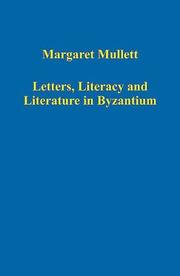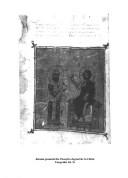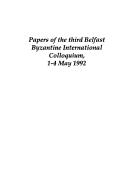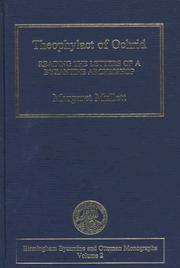| Listing 1 - 10 of 19 | << page >> |
Sort by
|
Book
ISSN: 09609997 ISBN: 0853898146 9780853898146 Year: 2007 Volume: 6/3 Publisher: Belfast Belfast Byzantine enterprises
Abstract | Keywords | Export | Availability | Bookmark
 Loading...
Loading...Choose an application
- Reference Manager
- EndNote
- RefWorks (Direct export to RefWorks)
Orthodox Eastern monasticism and religious orders --- Monasteries, Orthodox Eastern --- Monachisme et ordres religieux orthodoxes --- Monastères orthodoxes --- Theotokos Evergetis (Monastery : Istanbul, Turkey) --- Byzantine Empire --- Empire byzantin --- Church history --- Congresses. --- Histoire religieuse --- Congrès --- Conferences - Meetings --- Orthodox Eastern monasteries --- Monastic and religious life --- History --- Monastères orthodoxes --- Congrès --- Orthodox Eastern monasteries - Byzantine Empire - History - Congresses --- Orthodox Eastern monasticism and religious orders - Byzantine Empire - History - Congresses --- Monastic and religious life - History - Middle Ages, 600-1500 - Congresses --- Church history - Middle Ages, 600-1500 - Congresses --- Monastères byzantins --- Byzantine Empire - Church history - Congresses

ISBN: 9780754659372 0754659372 Year: 2007 Volume: 889 Publisher: Aldershot Burlington Ashgate
Abstract | Keywords | Export | Availability | Bookmark
 Loading...
Loading...Choose an application
- Reference Manager
- EndNote
- RefWorks (Direct export to RefWorks)

ISBN: 0704404206 9780704404205 Year: 1981 Publisher: Birmingham University of Birmingham. Centre for byzantine studies
Abstract | Keywords | Export | Availability | Bookmark
 Loading...
Loading...Choose an application
- Reference Manager
- EndNote
- RefWorks (Direct export to RefWorks)
Byzantine Empire --- Empire byzantin --- Civilization --- Classical influences --- Congresses --- Civilisation --- Influence classique --- Congrès --- Art, Byzantine --- Christian art and symbolism --- -Civilization --- -Classical influences --- -Congresses --- Conferences - Meetings --- Congrès --- Byzantium (Empire) --- Vizantii︠a︡ --- Bajo Imperio --- Bizancjum --- Byzantinē Autokratoria --- Vyzantinon Kratos --- Vyzantinē Autokratoria --- Impero bizantino --- Bizantia --- Congresses. --- Art, Byzantine - Congresses --- Christian art and symbolism - To 500 - Congresses --- Byzantine Empire - Civilization - Classical influences - Congresses

ISBN: 0853895813 Year: 1996 Volume: 4.1 Publisher: Belfast : Belfast Byzantine enterprises,
Abstract | Keywords | Export | Availability | Bookmark
 Loading...
Loading...Choose an application
- Reference Manager
- EndNote
- RefWorks (Direct export to RefWorks)
Alexius --- Congresses --- Congrès --- Byzantine Empire --- Empire byzantin --- History --- Histoire --- 949.5.03 --- Geschiedenis van Byzantium: Isaac I - Latijnse verovering--(1057-1204) --- Alexius I Comnenus, Emperor of the East --- -Congresses --- -History --- 949.5.03 Geschiedenis van Byzantium: Isaac I - Latijnse verovering--(1057-1204) --- Congrès --- Alexios --- Comnenus, Alexius, --- Komnēnos, Alexios, --- Kumnīn, Aliksiyūs, --- Alexis --- Comnène, Alexis, --- Komnin, Alekseĭ, --- Congresses. --- Byzantium (Empire) --- Vizantii︠a︡ --- Bajo Imperio --- Bizancjum --- Byzantinē Autokratoria --- Vyzantinon Kratos --- Vyzantinē Autokratoria --- Impero bizantino --- Bizantia

ISSN: 09609997 ISBN: 0853895031 9780853895039 Year: 1994 Volume: 6.1 Publisher: Belfast Belfast Byzantine Enterprises
Abstract | Keywords | Export | Availability | Bookmark
 Loading...
Loading...Choose an application
- Reference Manager
- EndNote
- RefWorks (Direct export to RefWorks)
Orthodox Eastern monasticism and religious orders --- Monachisme et ordres religieux orthodoxes --- Theotokos Evergetis (Monastery : Constantinople) --- Istanbul (Turkey) --- Istanbul (Turquie) --- Church history --- Histoire religieuse --- 232.931 --- 271 <495> --- Maria. Mariologie --- Kloosterwezen. Religieuze orden en congregaties. Monachisme--Griekenland --- 232.931 Maria. Mariologie

ISBN: 0860785491 9780860785491 Year: 1997 Volume: v. 2 Publisher: Aldershot Variorum Repr.
Abstract | Keywords | Export | Availability | Bookmark
 Loading...
Loading...Choose an application
- Reference Manager
- EndNote
- RefWorks (Direct export to RefWorks)
Byzantine letters --- Church history --- Lettres (Genre littéraire) byzantines --- Eglise --- History and criticism. --- Histoire et critique --- Histoire --- Theophylactus, --- Orthodox Eastern Church --- Eglise orthodoxe --- Bishops --- Correspondence --- Evêques --- Correspondance --- Byzantine Empire --- Empire byzantin --- Histoire religieuse --- History and criticism --- -Church history --- -Christianity --- Ecclesiastical history --- History, Church --- History, Ecclesiastical --- History --- Christianity --- Byzantine literature --- Theophylactus of Ochrida, Archbishop of Ochrida --- -Correspondence --- -History and criticism --- -Eastern Orthodox Church --- Pravoslavnai︠a︡ vostochnai︠a︡ t︠s︡erkovʹ --- Holy Orthodox Catholic Apostolic Church --- Holy Orthodox Eastern Catholic and Apostolic Church --- Greek Church --- Orthodoxos Katholikē Ekklēsia --- Orthodoxos Katholikē kai Anatolikē Ekklēsia --- Kanīsah al-Sharqīyah --- Tung cheng chiao --- Kanīsat al-Masīḥ al-Sharqīyah al-Urthudhuksīyah --- Biserica Ortodoxă --- .كنيسة الشرقية الارثوذكسية --- -Bishops --- Lettres (Genre littéraire) byzantines --- Evêques --- Middle Ages, 600-1500 --- Feofilakt, --- Ochrida, --- Teofilakt, --- Teofylakt, --- Theofylakt, --- Theofylaktos, --- Theophylacht, --- Theophylact, --- Theophylaktos, --- Byzantine letters - History and criticism --- Church history - Middle Ages, 600-1500 --- Theophylactus, - of Ochrida, Archbishop of Ochrida, - ca. 1050-ca. 1108 - Correspondence - History and criticism --- Théophylacte, --- Theophylactos, --- Theophylakt, --- Achrida, Theophylactus de, --- Theofýlaktos, --- Θεοφυλακτος, --- Theophylactus, - of Ochrida, Archbishop of Ochrida, - ca. 1050-ca. 1108
Book
ISSN: 09609997 ISBN: 0853897123 9780853897125 Year: 1997 Volume: 6/2 Publisher: Belfast Queen's University
Abstract | Keywords | Export | Availability | Bookmark
 Loading...
Loading...Choose an application
- Reference Manager
- EndNote
- RefWorks (Direct export to RefWorks)
Book
Publisher: Aldershot [GB] ; Brookfield [USA] Variorum ; Ashgate Publishing ltd.
Abstract | Keywords | Export | Availability | Bookmark
 Loading...
Loading...Choose an application
- Reference Manager
- EndNote
- RefWorks (Direct export to RefWorks)
Book
ISSN: 09609997 ISBN: 0853898715 9780853898719 Year: 2004 Volume: 9 Publisher: Belfast: Belfast Byzantine enterprises,
Abstract | Keywords | Export | Availability | Bookmark
 Loading...
Loading...Choose an application
- Reference Manager
- EndNote
- RefWorks (Direct export to RefWorks)
Byzantine literature --- Translating and interpreting --- History and criticism --- Translating --- History --- Traductions --- Jordan, Robert Hamilton --- Literatur. --- Mittelgriechisch. --- Mittelgriechische Literatur --- Translating and interpreting. --- Übersetzung. --- History and criticism. --- History. --- Byzantinisches Reich.
Book
ISBN: 0884024210 9780884024217 Year: 2017 Publisher: Washington, DC: Dumbarton Oaks research library and collection,
Abstract | Keywords | Export | Availability | Bookmark
 Loading...
Loading...Choose an application
- Reference Manager
- EndNote
- RefWorks (Direct export to RefWorks)
"Byzantine culture was notably attuned to a cosmos of multiple dominions: material, bodily, intellectual, physical, spiritual, human, divine. Despite a prevailing discourse to the contrary, the Byzantine world found its bridges between domains most often in sensory modes of awareness. These different domains were concretely perceptible and were encountered daily amidst the mundane no less than the exalted. Icons, incense, music, sacred architecture, ritual activity; saints, imperial families, persons at prayer; hymnography, ascetical or mystical literature: in all of its cultural expressions, the Byzantines excelled in highlighting the intersections between human and divine realms through sensory engagement (whether positive or negative). Byzantinists have been slow to look at the operations of the senses in Byzantium, especially those of seeing, its relation to the other senses, and phenomenological approaches in general. More recently, work on smell and hearing has followed that on seeing, and yet the areas of taste and touch--the most universal and most necessary of the senses--are still largely uncharted. Nor has much been done to explore how Byzantines viewed the senses, or how they envisaged the sensory interactions with their world. A map of the connections between sense-perceptions and other processes (of perception, memory, visualization) in the Byzantine brain has still to be sketched out. How did the Byzantines describe, narrate, or represent the senses at work? It is hoped to further studies of how individual senses in Byzantium operated in the context of all the senses, and their place in Byzantine thought about perception and cognition. Recent work on dreaming, on memory, and on the emotions has made advances possible, and collaborative experiments between Byzantinists and neurological scientists open further approaches. The happy coincidence of this symposium with the upcoming Garden and Landscape Studies Symposium, 'Sound and Scent in the Garden, ' and a forthcoming exhibition at the Walters Art Museum on the five senses enables cross-cultural comparisons that include gardens in Islamic Spain, Hebrew hymnography, Syriac wine-poetry, Mediterranean ordure, and Romanesque and Gothic precious objects that were not just looked at but also touched, smelled, and heard. Architects, musicologists, art historians, archaeologists, philologists can all contribute approaches to the revelation of the Byzantine sensorium"--Publisher's website.
Byzance --- Senses and sensation --- Senses and sensation --- Senses and sensation --- Perception --- Cognition --- Byzantine Empire --- Byzantine Empire --- Byzantine Empire
| Listing 1 - 10 of 19 | << page >> |
Sort by
|

 Search
Search Feedback
Feedback About
About Help
Help News
News